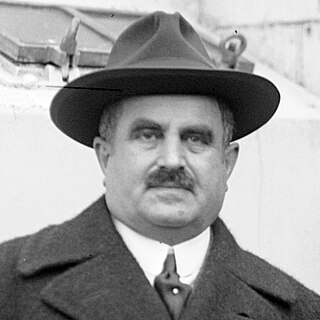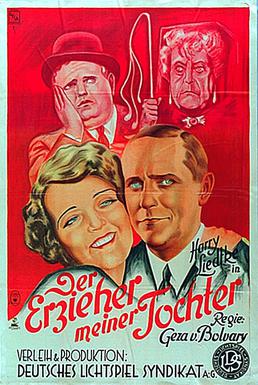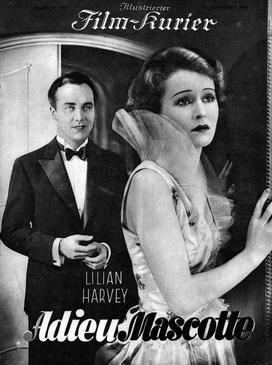Related Research Articles
Carl Wilhelm, was a prolific German film director, film producer and screenwriter of the silent film era, at the end of which his career apparently entirely faded away and he vanished into obscurity.

The Oyster Princess is a 1919 German silent comedy film directed by Ernst Lubitsch and starring Victor Janson, Ossi Oswalda and Harry Liedtke. It is a grotesque comedy in four acts about an American millionaire's spoiled daughter's marriage that does not go as planned. It was shot at the Tempelhof Studios in Berlin. The film's sets were designed by the art director Kurt Richter, a frequent collaborator of Lubitsch.
Hanns Kräly, credited in the United States as Hans Kraly, was a German actor and screenwriter. His main collaborations were with director Ernst Lubitsch, and they worked together on 30 films between 1915 and 1929. In 1930, their longstanding partnership and with that much of Kräly's reputable career as a screenwriter came to an end due to an affair he was having with Lubitsch's then-wife Helene Krauss. Kräly is also notable for his comedy play Kohlhiesel's Daughters which has been turned into films on a number of occasions.

The Doll is a 1919 German romantic fantasy comedy film directed by Ernst Lubitsch. The film is based on the operetta La poupée by Edmond Audran (1896) and a line of influence back through the Léo Delibes ballet Coppélia (1870) and ultimately to E. T. A. Hoffmann's short story "Der Sandmann" (1816).
This is a list of films directed by Ernst Lubitsch. He made a total of 73 films in a career that spanned 4 decades.

The Wildcat, subtitled A Grotesque in Four Acts, is a 1921 German silent, farcical romantic comedy film directed by Ernst Lubitsch. It was shot at the Tempelhof Studios in Berlin.
Events in the year 1892 in Germany.

Paul Davidson was a German film producer.

Carmen is a 1918 German silent drama film directed by Ernst Lubitsch and starring Pola Negri, Harry Liedtke, and Leopold von Ledebur. It was based on the novella Carmen by Prosper Mérimée. Like Bizet's opera Carmen, this film only adapts the third part of Mérimée's novella and transforms the character of Don José at the beginning of the story from bandit on the run to honest man in love with his childhood sweetheart. The film was released with English intertitles in the United States in 1921 under the alternative title Gypsy Blood.

The Young Man from the Ragtrade is a 1926 German silent comedy film directed by Richard Löwenbein and starring Curt Bois, Maria Paudler, and Frida Richard. Bois' character of an ambitious young man was closely modelled on the early film appearances of Ernst Lubitsch.

The Prince of Pappenheim is a 1927 German silent comedy film directed by Richard Eichberg and starring Mona Maris, Curt Bois and Dina Gralla. Bois' character of an ambitious young man was closely modelled on the early film appearances of Ernst Lubitsch. It was shot at the Babelsberg Studios and on location in Baden-Baden. The film's art direction was by Jacek Rotmil. It premiered at the Gloria-Palast in Berlin.

Albert Paulig was a German film actor who was popular during the silent era. Paulig made his first film in 1914. The following year he appeared in one of Ernst Lubitsch's first directorial attempts, A Trip on the Ice (1915). Paulig was in a number of Harry Piel, thrillers including The Man Without Nerves (1924).

My Daughter's Tutor is a 1929 German silent comedy film directed by Géza von Bolváry and starring Harry Liedtke, Dolly Davis, and Charles Puffy. The plot closely mirrored that of Ernst Lubitsch's The Oyster Princess. It was shot at the Tempelhof Studios in Berlin. The film's art director was Robert Neppach.

The Imaginary Baron is a 1927 German silent comedy film directed by Willi Wolff and starring Reinhold Schünzel and Marlene Dietrich. It was made at the Tempelhof Studios in Berlin. The film's sets were designed by the art director Ernst Stern.

His Late Excellency is a 1927 German silent comedy film directed by Adolf E. Licho and Wilhelm Thiele and starring Willy Fritsch, Olga Chekhova, and Ernst Gronau. It was shot at the Tempelhof Studios in Berlin. The film's sets were designed by the art directors Erich Czerwonski and Günther Hentschel.

The Model from Montparnasse or Adieu Mascotte is a 1929 German comedy film directed by Wilhelm Thiele and starring Lilian Harvey, Igo Sym and Marietta Millner. Originally made as a silent film, it later had synchronized sound added. It is set in the Demimonde of Paris with a heroine working as an artist's model.

The Firm Gets Married is a 1931 German musical comedy film directed by Carl Wilhelm and starring Ralph Arthur Roberts, Charlotte Ander, and Oskar Karlweis. It is a remake of a 1914 silent comedy The Firm Gets Married starring Ernst Lubitsch.
From a Bachelor's Diary is a 1929 German silent comedy film directed by Erich Schönfelder and starring Reinhold Schünzel, Leopold von Ledebur and Anton Pointner.

The Tempelhof Studios are a film studio located in Tempelhof in the German capital of Berlin. They were founded in 1912, during the silent era, by German film pioneer Alfred Duskes, who built a glass-roofed studio on the site with financial backing from the French company Pathé. The producer Paul Davidson's PAGU then took control and constructed a grander structure. The First World War propaganda drama The Yellow Passport, the historical comedy Madame DuBarry and the expressionist 1920 silent film The Golem were made there by PAGU.

Swifter Than Death is a 1925 French-Germany silent action film directed by Gérard Bourgeois and Harry Piel and starring Piel, Dary Holm, Denise Legeay and José Davert. It was shot at the Cité Elgé Studios in Paris and on location in Munich and the Côte d'Azur. The film's sets were designed by the art director Fritz Kraenke.
References
- ↑ Elsaesser p.213